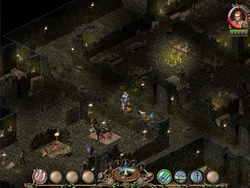RPG Codex Interview: Monte Cook on Dungeons & Dragons and RPG Design
RPG Codex Interview: Monte Cook on Dungeons & Dragons and RPG Design
Interview - posted by Crooked Bee on Thu 16 August 2012, 11:19:48
Tags: Dungeons & Dragons; Monte Cook; PnP InterviewIn this installment of the RPG Codex Pen&Paper Interview series, we offer you an interview with Monte Cook himself. A legend of the PnP industry, Monte Cook is one of the main authors of the 3rd edition Dungeons & Dragons and D20. He worked a lot with variations of the theme, even adapting Call of Cthulhu and World of Darkness to D20, besides making compelling 3rd party books. Before that, he worked on the Planescape setting and in the Rolesmaster game. He was also in the 5e team for a while, but left WotC recently.
The questions all belong to our resident PnP expert Alex. We are grateful to Monte Cook for taking time out of his schedule to answer them.
RPG Codex: You started your game designer career working on the Rolemaster game system. Could you tell us a bit about your work with the system and how, if at all, it shaped the way you see RPGs?
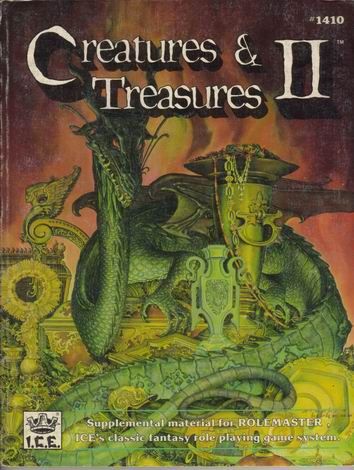
Creatures & Treasures II, one of the Rolemaster supplements that Monte Cook designed.
RPG Codex: Personally, I think Rolemaster is a pretty interesting system. On the one hand, it has a lot of different rules and tables, trying to model all kinds of situations a roleplaying group might find itself in, especially when you throw in sourcebooks. On the other hand, even though it is a very detailed system, rulewise, many of the results it gives you are relatively open. Instead of just giving you mechanical effects, critical tables frequently have results that go beyond the little numbers in their squares, requiring creativity on the part of the players to really make that result important. What are your thoughts on this dichotomy?
RPG Codex: After Rolemaster, you worked on the second edition of AD&D, on various sourcebooks and modules. Could you tell us a little about how different the design culture between the two games were? Specifically, it seems to me AD&D at that time tried focusing on settings, the overall impression being that it was trying to outdo White Wolf in their own game. Do you agree with that impression, and if so, did this clash with the old philosophy they had, of making games that were more sandbox oriented?
RPG Codex: You did a lot of work on the Planescape setting. Modules like Dead Gods, The Great Modron March and even the Faction War bear your name in the credits. So do a few of the setting oriented books, like The Inner Planes and Planes of Conflict. How was it working on the setting? What were the parts of the Planescape you most enjoyed? Which ones did you wish you could change? What are your thoughts about the way the Faction War destroyed a lot of what you built before?
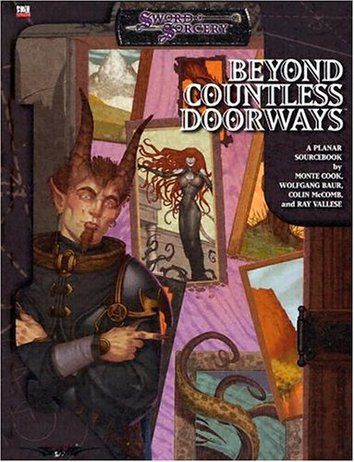
Beyond Countless Doorways, a "Planescape reunion" sourcebook written by Monte Cook, Colin McComb, Zeb Cook, Michele Carter, Ray Vallese, and Wolfgang Baur.
RPG Codex: By the way, many of the people here on the Codex happen to love the setting, not only because its own qualities, but because of the Planescape: Torment computer game released by Interplay. Did you get to interact with the Torment team in any way while they were doing the game? Have you played the game, and if so, do you have any thoughts on their vision of the setting?
RPG Codex: Speaking of Planescape again, one interesting aspect of it is that, while it is supposed to connect any and all D&D universes, it isn't itself without color, flavor and smell. It has its own thing going on, and not any idea someone could come up with would mesh well with the setting. Were there any ideas you really liked, but couldn't write them in because of that?
RPG Codex: While most of your work has dealt with fantasy, you have never shied away from other genres. You wrote the Dark Space setting, worked on the D20 conversions of World of Darkness and Call of C'thulhu, worked on the Dark Matter setting, etc. Are there any kinds of setting you would like to tackle eventually but still hasn't able to?
RPG Codex: You were one of the main designers of the 3rd edition of D&D (and consequently, D20). Not only that, but you also wrote many books using the overall system and philosophy. What would you say is the most important design aspect of these games, the thing that makes 3e what it is? Or D20, D20, if you prefer?
RPG Codex: One aspect of 3e that seemed to differ from its predecessors is how it is less open than it is predecessors. I mean, the original white-box D&D didn't care to define so many things some people have trouble reading its rules. The 1st, and then the 2nd editions tried to make things more spelled out, but the game still frequently didn't care to define what the exact effect of a magic item might be in terms of rules, or what conditions might be necessary to use it. Third edition, on the other hand, tries to make things clearer, it tries to unify rules and have any word used in them be well defined. Why did you choose this approach, what benefits do you see in it? What about cons? Did this have anything to do with Wizards of the Coast's own gaming culture?
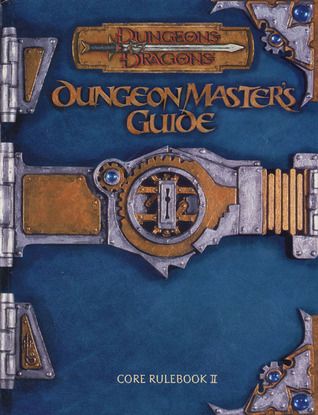
Dungeon Master's Guide for Dungeons & Dragons 3rd edition.
RPG Codex: You also kept tinkering the formula outside Wizards of the Coast with book after book that tried different things with D20, releasing books such as Arcana Unearthed, the Books of Experimental Might, the Eldritch Might books, among others. Are you done with the basic D20 format? Or would you like to expand it further? Rules-wise, which of your books are you most proud of? Would you now like to rework some aspect of it?
RPG Codex: I understand you have a deep love for writing settings. You wrote the Ptolus book, a behemoth of more than 600 pages. Could you talk a little about what you consider most important when designing a setting? What qualities do you think are important in a setting to be used for role playing games? Do these conflict with some of the qualities of a good setting for books and movies?
RPG Codex: In particular, as far as settings are concerned, I have heard at least some complaints about how 3e dealt with settings. Some fans of the 2nd edition settings like Darksun or Planescape seemed to feel that converting them to 3e's more balanced, structured approach went headlong against some aspects of the settings, trying to "fit a square peg in a round hole". Do you think such criticism is fair, that these settings would be better played in another game system? What are your thoughts on the limits of settings for 3e and RPGs in general?
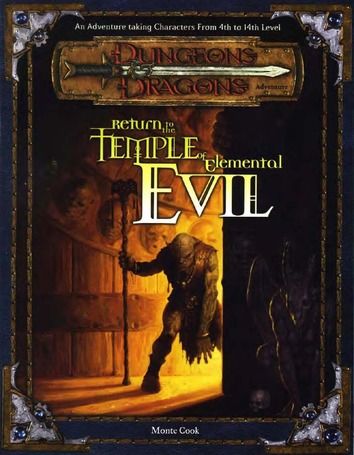
Return to the Temple of Elemental Evil, an adventure module for the 3rd edition of D&D written by Monte Cook.
RPG Codex: You wrote the module Return to the Temple of Elemental Evil. Not too long after it, Troika Games released a computer adaption of the first Temple of Elemental Evil, but using the 3rd edition rules (in fact, the only computer game that implemented 3rd edition rules as they are written, turn based). Was there any exchange of ideas between you and the Troika team? Did you ever have the opportunity to play their game, and if so, what was your opinion of it? Also, did WotC at any point consider basing the game on your own module instead, and take advantage of reciprocal promotion?
RPG Codex: Speaking of computer games and the third edition, do you feel that the less open rules system of 3e makes it a better candidate for transition to computers than 2e, as it requires less GM adjudicating? In what ways do you think computer RPGs are more limited than table top ones (if at all), and how far do you think it would be possible for them to go? Do you think that having a rules system open to adjudicating is important for a pencil and paper roleplaying game?
RPG Codex: After you were done with Malhavoc, you decided to focus on writing fiction, correct? Why did you make this decision? Were you burned out of RPG design? Also, could you tell us a bit about how you see these two things relating? In what ways can creative writing help and RPG? In what ways do the addition of an interactive element make this tricky?
RPG Codex: Speaking of different views of D&D, this has become quite accentuated. Thanks to Paizo's Pathfinder being similar, design-wise, to 3e and many Old School Renaissance efforts such as Labyrinth Lord and Castles & Crusades, the differences in design and philosophy of the games are more pronounced than ever. How do you feel about that? Do you have any take on why the different styles appeal differently to different people? Do you think all this segmentation can be harmful to the industry? Do you see this as enabling a cross pollination of styles, allowing new things not done before?
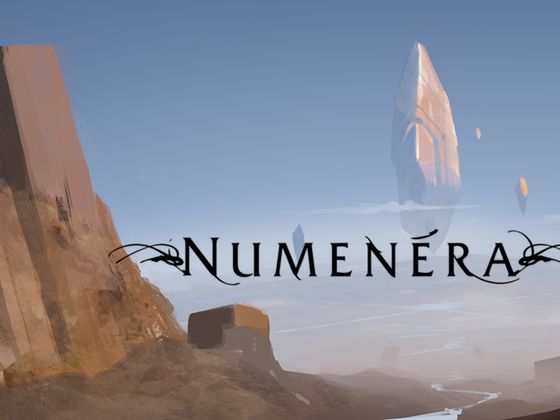
Numenera, Monte Cook's upcoming game, "a post-apocalyptic science fantasy set in the far distant future" currently running its Kickstarter campaign.
RPG Codex: Since leaving Wizards, you have gone back to your own endeavor, the Monte Cook Games site. From your blog, it seems like you are working on a new system already. Could you tell us a bit about what you have in mind and how it differs from your previous work?
RPG Codex: Thank you for your time.
Special thanks are due to Sceptic and Zed for their feedback on the questions.
The questions all belong to our resident PnP expert Alex. We are grateful to Monte Cook for taking time out of his schedule to answer them.
RPG Codex: You started your game designer career working on the Rolemaster game system. Could you tell us a bit about your work with the system and how, if at all, it shaped the way you see RPGs?
Monte Cook: I started with RM because that was the game I was playing at the time (in college). I liked the veneer or precision that the game offered -- specific wounds, granular distinctions between weapons, 50 levels of spells, and so on. It also offered me the ability to handle many levels of play (high level in RM, while crazy over-the-top, is probably easier to deal with than high level in earlier versions of D&D). It also offered an easy way to combine science fiction and fantasy with the inclusion of Space Master. This figured into both of my first books, Creatures and Treasures II and Dark Space. C&T II was a bestiary and magic-item book, and while it was mostly fantasy it included some sci fi stuff, which was expanded in Dark Space -- a setting book for Lovecraftian science fantasy gaming.
Being my first professional work, working with Iron Crown Enterprises taught me all the basics -- deadlines, professionalism, and the importance of quality work. I owe a lot to people like Coleman Charlton and Kevin Barrett who taught me a lot. Beyond those obvious things, working on RM taught me that not everyone wanted the same thing from an rpg. While some people loved the game, others despised it and mocked it. I hadn't experienced that kind of gamer dichotomy until I became a professional in the industry.
Being my first professional work, working with Iron Crown Enterprises taught me all the basics -- deadlines, professionalism, and the importance of quality work. I owe a lot to people like Coleman Charlton and Kevin Barrett who taught me a lot. Beyond those obvious things, working on RM taught me that not everyone wanted the same thing from an rpg. While some people loved the game, others despised it and mocked it. I hadn't experienced that kind of gamer dichotomy until I became a professional in the industry.

Creatures & Treasures II, one of the Rolemaster supplements that Monte Cook designed.
RPG Codex: Personally, I think Rolemaster is a pretty interesting system. On the one hand, it has a lot of different rules and tables, trying to model all kinds of situations a roleplaying group might find itself in, especially when you throw in sourcebooks. On the other hand, even though it is a very detailed system, rulewise, many of the results it gives you are relatively open. Instead of just giving you mechanical effects, critical tables frequently have results that go beyond the little numbers in their squares, requiring creativity on the part of the players to really make that result important. What are your thoughts on this dichotomy?
MC: I know that for me, RM greatly encouraged creativity. Despite the structure that appeared on the charts, the system was actually kind of fast and loose. Creating monsters, for example, could be done on the fly. Likewise with spells. Unlike other games, it was very easy to create new material and keep it relatively balanced. The other thing is, RM's reputation for complexity is a little undeserved. While there are a ton of charts, there's really just one core resolution mechanic -- roll d100 and add a number (skill bonus or attack bonus or whatever, derived from stats, level, and skill purchasing mechanics).
RPG Codex: After Rolemaster, you worked on the second edition of AD&D, on various sourcebooks and modules. Could you tell us a little about how different the design culture between the two games were? Specifically, it seems to me AD&D at that time tried focusing on settings, the overall impression being that it was trying to outdo White Wolf in their own game. Do you agree with that impression, and if so, did this clash with the old philosophy they had, of making games that were more sandbox oriented?
MC: I don't think anyone at TSR was thinking about WW when designing a strategy. TSR was extremely isolated in its thinking. It was top dog and didn't feel much need to pay attention to the rest of the industry. This didn't change until the release of Magic: The Gathering, and that wasn't an rpg issue at all.
TSR and ICE were very, very different. ICE was small and the president was as likely as not to have lunch with the lowest employee. TSR was structured and the creatives steered well clear of the executives. Both places, however, were very fun, very enjoyable environments with good people. ICE ran into financial troubles, which darkened things, but in the end so did TSR, so in those ways they were similar too.
You're right though, TSR was focused on setting and adventures at the time, and ICE (at least as far as RM goes) on rules. It's a very different kind of design, but I enjoy both.
TSR and ICE were very, very different. ICE was small and the president was as likely as not to have lunch with the lowest employee. TSR was structured and the creatives steered well clear of the executives. Both places, however, were very fun, very enjoyable environments with good people. ICE ran into financial troubles, which darkened things, but in the end so did TSR, so in those ways they were similar too.
You're right though, TSR was focused on setting and adventures at the time, and ICE (at least as far as RM goes) on rules. It's a very different kind of design, but I enjoy both.
RPG Codex: You did a lot of work on the Planescape setting. Modules like Dead Gods, The Great Modron March and even the Faction War bear your name in the credits. So do a few of the setting oriented books, like The Inner Planes and Planes of Conflict. How was it working on the setting? What were the parts of the Planescape you most enjoyed? Which ones did you wish you could change? What are your thoughts about the way the Faction War destroyed a lot of what you built before?
MC: Planescape was wildly imaginative -- I loved the creative freedom it offered. It encouraged thinking so far out of the box that every day was a new challenge. I loved working on that team -- it was both rewarding and a hell of a lot of fun.
Faction War was never meant to be the end of PS. There was supposed to be a follow-up adventure/sourcebook that rebuilt things. But the line was cancelled before it could come out. A real shame. In later years, however, I was able to produce a sort of Planescape reunion product for Malhavoc Press called Beyond Countless Doorways. I brought together Zeb Cook, Michele Carter, Colin McComb, Ray Vallese, and Wolfgang Baur, some of the core minds that PS came from, and we put together a d20 sourcebook about planar travel that I'm really proud of.
Faction War was never meant to be the end of PS. There was supposed to be a follow-up adventure/sourcebook that rebuilt things. But the line was cancelled before it could come out. A real shame. In later years, however, I was able to produce a sort of Planescape reunion product for Malhavoc Press called Beyond Countless Doorways. I brought together Zeb Cook, Michele Carter, Colin McComb, Ray Vallese, and Wolfgang Baur, some of the core minds that PS came from, and we put together a d20 sourcebook about planar travel that I'm really proud of.

Beyond Countless Doorways, a "Planescape reunion" sourcebook written by Monte Cook, Colin McComb, Zeb Cook, Michele Carter, Ray Vallese, and Wolfgang Baur.
RPG Codex: By the way, many of the people here on the Codex happen to love the setting, not only because its own qualities, but because of the Planescape: Torment computer game released by Interplay. Did you get to interact with the Torment team in any way while they were doing the game? Have you played the game, and if so, do you have any thoughts on their vision of the setting?
MC: I love the game. The Planescape team did get to work with the Torment team on the setting (sort of as an approval process), and one designer, Colin McComb, worked on both the computer game and the tabletop game.
RPG Codex: Speaking of Planescape again, one interesting aspect of it is that, while it is supposed to connect any and all D&D universes, it isn't itself without color, flavor and smell. It has its own thing going on, and not any idea someone could come up with would mesh well with the setting. Were there any ideas you really liked, but couldn't write them in because of that?
MC: Not really. Even the most outlandish ideas could be tucked away into the demiplanes or some other relatively unknown corner of the multiverse.
RPG Codex: While most of your work has dealt with fantasy, you have never shied away from other genres. You wrote the Dark Space setting, worked on the D20 conversions of World of Darkness and Call of C'thulhu, worked on the Dark Matter setting, etc. Are there any kinds of setting you would like to tackle eventually but still hasn't able to?
MC: I love post-apocalyptic stuff. I got to do a little of that in the World of Darkness re-imagining that I did, but I plan on doing more in the future with my new game, Numenera.
RPG Codex: You were one of the main designers of the 3rd edition of D&D (and consequently, D20). Not only that, but you also wrote many books using the overall system and philosophy. What would you say is the most important design aspect of these games, the thing that makes 3e what it is? Or D20, D20, if you prefer?
MC: Unified mechanical systems, well-defined rules, and a heavy dose of quantified simulation. If you want an effect -- a spell, a trap, a creature, etc. -- you quantify it in pre-described ways. If you make an NPC or creature, it functions in the world in the same way that PCs do.
RPG Codex: One aspect of 3e that seemed to differ from its predecessors is how it is less open than it is predecessors. I mean, the original white-box D&D didn't care to define so many things some people have trouble reading its rules. The 1st, and then the 2nd editions tried to make things more spelled out, but the game still frequently didn't care to define what the exact effect of a magic item might be in terms of rules, or what conditions might be necessary to use it. Third edition, on the other hand, tries to make things clearer, it tries to unify rules and have any word used in them be well defined. Why did you choose this approach, what benefits do you see in it? What about cons? Did this have anything to do with Wizards of the Coast's own gaming culture?
MC: To keep things from being ambiguous for the DM -- fewer judgement calls or "wing-it" situations. It's easier for a new DM to do so "by the book." The cons are, an experienced DM who doesn't need that kind of strict guidance ends up being a little too tied to the rules. Or rather, his hands are tied. It created a culture where players felt like they could tell the DM he was playing "wrong" if he wasn't obeying the rules. The rules run the game, not the DM. This isn't true of every game, mind you. It's just a problem in some games.

Dungeon Master's Guide for Dungeons & Dragons 3rd edition.
RPG Codex: You also kept tinkering the formula outside Wizards of the Coast with book after book that tried different things with D20, releasing books such as Arcana Unearthed, the Books of Experimental Might, the Eldritch Might books, among others. Are you done with the basic D20 format? Or would you like to expand it further? Rules-wise, which of your books are you most proud of? Would you now like to rework some aspect of it?
MC: I'm most proud of 3E itself, of course. And as you say, I've reworked a lot of it again and again. Currently, I could see myself writing more adventures or sourcebooks for the system, but I think my system work on it is done. See The Books of Experimental Might for the way I'd run a d20 game today.
RPG Codex: I understand you have a deep love for writing settings. You wrote the Ptolus book, a behemoth of more than 600 pages. Could you talk a little about what you consider most important when designing a setting? What qualities do you think are important in a setting to be used for role playing games? Do these conflict with some of the qualities of a good setting for books and movies?
MC: The most important thing about presenting a setting is to make it usable by the DM. In the end, it will be his setting, and he's got to run the games set there. Covering every detail is less important than giving the DM the ability to craft the details himself.
RPG Codex: In particular, as far as settings are concerned, I have heard at least some complaints about how 3e dealt with settings. Some fans of the 2nd edition settings like Darksun or Planescape seemed to feel that converting them to 3e's more balanced, structured approach went headlong against some aspects of the settings, trying to "fit a square peg in a round hole". Do you think such criticism is fair, that these settings would be better played in another game system? What are your thoughts on the limits of settings for 3e and RPGs in general?
MC: I suppose. I think it's not impossible to use 3E's rules to cover any setting or idea, I just think it's more challenging to do so well. 3E requires more of a designer than prior editions, at least on a systemic-design, rather than content-design, level. That said, some settings and situations cry out of less attention to rules so that you can spend more design- and DM-space to characters, plot, and flavor.

Return to the Temple of Elemental Evil, an adventure module for the 3rd edition of D&D written by Monte Cook.
RPG Codex: You wrote the module Return to the Temple of Elemental Evil. Not too long after it, Troika Games released a computer adaption of the first Temple of Elemental Evil, but using the 3rd edition rules (in fact, the only computer game that implemented 3rd edition rules as they are written, turn based). Was there any exchange of ideas between you and the Troika team? Did you ever have the opportunity to play their game, and if so, what was your opinion of it? Also, did WotC at any point consider basing the game on your own module instead, and take advantage of reciprocal promotion?
MC: I had no input on the game, but I did play it. I enjoyed it. I have no idea if there was ever any discussion regarding adapting my adventure to a computer platform. If there was, I certainly wasn't involved. That would have been cool, though.
RPG Codex: Speaking of computer games and the third edition, do you feel that the less open rules system of 3e makes it a better candidate for transition to computers than 2e, as it requires less GM adjudicating? In what ways do you think computer RPGs are more limited than table top ones (if at all), and how far do you think it would be possible for them to go? Do you think that having a rules system open to adjudicating is important for a pencil and paper roleplaying game?
MC: I suspect a 3E game is easier to code than a 2E game (in fact, I know it to be true). Computer games are limited in their inability to handle non-proscribed actions. Imaginative players are better off playing a tabletop game. In order for this not to be the case, we'll need actual artificial intelligence.
I think GM adjudication is the very heart of a tabletop rpg. The most important part, and certainly what distinguishes it from a computer game.
I think GM adjudication is the very heart of a tabletop rpg. The most important part, and certainly what distinguishes it from a computer game.
RPG Codex: After you were done with Malhavoc, you decided to focus on writing fiction, correct? Why did you make this decision? Were you burned out of RPG design? Also, could you tell us a bit about how you see these two things relating? In what ways can creative writing help and RPG? In what ways do the addition of an interactive element make this tricky?
MC: I am interesting in all kinds of writing. I needed a break from the structure of game writing.
Fiction writing and game design are very, very different, and I would look questioningly at anyone who said otherwise. Fiction is storytelling, pure and simple, and RPG design is giving other people the right tools and materials so that they can tell stories.
Fiction writing and game design are very, very different, and I would look questioningly at anyone who said otherwise. Fiction is storytelling, pure and simple, and RPG design is giving other people the right tools and materials so that they can tell stories.
RPG Codex: Speaking of different views of D&D, this has become quite accentuated. Thanks to Paizo's Pathfinder being similar, design-wise, to 3e and many Old School Renaissance efforts such as Labyrinth Lord and Castles & Crusades, the differences in design and philosophy of the games are more pronounced than ever. How do you feel about that? Do you have any take on why the different styles appeal differently to different people? Do you think all this segmentation can be harmful to the industry? Do you see this as enabling a cross pollination of styles, allowing new things not done before?
MC: I think people should be able to play what they want to play, how they want to play it. It's not the segmentation that's a problem, it's the intolerance for other play styles. I hate to see that tearing us (gamers) apart. There was a time, back when I started playing (the mid-70s and into the 80s) when everyone played a little bit of everything, and even if you didn't, you didn't look down on those that did.

Numenera, Monte Cook's upcoming game, "a post-apocalyptic science fantasy set in the far distant future" currently running its Kickstarter campaign.
RPG Codex: Since leaving Wizards, you have gone back to your own endeavor, the Monte Cook Games site. From your blog, it seems like you are working on a new system already. Could you tell us a bit about what you have in mind and how it differs from your previous work?
MC: It's a game called Numenera, and I have been, and will continue to write extensively about it. It's a post-apocalyptic science fantasy set in the far distant future. The game focuses mainly on the story and the action, and less on the rules. It's a game that empowers both GM and players over the rules as written in many ways. In many ways, this is a return to my roots, both in its approach to gaming (very similar to the way I ran games back in early D&D) and in its relationship to things like Planescape, where the cool setting and amazing ideas took precedence over things like tactical combat and super-detailed rules. I hope people will take a look at both montecookgames.com and numenera.com for more on the new game as it takes shape.
RPG Codex: Thank you for your time.
Special thanks are due to Sceptic and Zed for their feedback on the questions.
There are 16 comments on RPG Codex Interview: Monte Cook on Dungeons & Dragons and RPG Design











